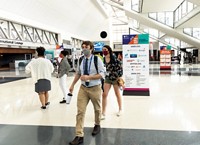Advertisement
Grab your lab coat. Let's get started
Welcome!
Welcome!
Create an account below to get 6 C&EN articles per month, receive newsletters and more - all free.
It seems this is your first time logging in online. Please enter the following information to continue.
As an ACS member you automatically get access to this site. All we need is few more details to create your reading experience.
Not you? Sign in with a different account.
Not you? Sign in with a different account.
ERROR 1
ERROR 1
ERROR 2
ERROR 2
ERROR 2
ERROR 2
ERROR 2
Password and Confirm password must match.
If you have an ACS member number, please enter it here so we can link this account to your membership. (optional)
ERROR 2
ACS values your privacy. By submitting your information, you are gaining access to C&EN and subscribing to our weekly newsletter. We use the information you provide to make your reading experience better, and we will never sell your data to third party members.
ACS Meeting News
Boston hosts ACS national meeting
Council approves lifting restrictions on financial support for international chapters
by Linda Wang
August 24, 2018
| A version of this story appeared in
Volume 96, Issue 34

About 14,500 chemical scientists from around the world gathered in Boston for the 256th ACS National Meeting & Exposition on Aug. 19–23. In total, 10,543 papers were presented in programming by 29 technical divisions and six committees highlighting the meeting’s theme of “Nanoscience, Nanotechnology & Beyond.”

The opening session featured a lecture by Leroy Hood of the Institute for Systems Biology, who laid out the myriad opportunities for nanoscience and chemistry to transform health care and medicine.
During the board of directors’ regular meeting, which was open to all attendees, Nobel laureate Fraser Stoddart encouraged the audience to create transformative research by doing their own thing.
Stoddart also attended several events celebrating the 50th anniversary of ACS Project SEED, the society’s summer research program for underrepresented minority high school students. Stoddart is serving as champion for the 50 Forward campaign to raise financial support for the program.
Jill Millstone of the University of Pittsburgh presented the Kavli Foundation Emerging Leader in Chemistry Lecture on using metal-ligand chemistry to improve nanoparticle synthesis and performance. And Harry Atwater of California Institute of Technology gave the Fred Kavli Innovations in Chemistry Lecture on how to harness light as fuel.
#ACSBoston by the numbers
▸ Attendance: ≈14,500
▸ Papers presented: 10,543
▸ Exhibiting companies: 301
▸ Job seekers at the ACS Career Fair: 539
▸ Employers at the ACS Career Fair: 48
▸ Positions at the ACS Career Fair: 62
During the ACS Board’s executive session, the board voted, among other actions, to approve an advance member registration fee of $490 for national meetings held in 2019, which is equal to the current fee adjusted for inflation. No other incremental fee will be added to the registration fee for 2019.
At the ACS Council meeting, the Committee on Budget & Finance reported that ACS’s projected 2018 revenues will reach $565.1 million, net contribution from operations will reach $31.8 million, and total expenses will reach $533.3 million.
The council approved a clarification allowing local sections and divisions to affiliate with other technical organizations upon council approval. The council also approved a petition that in part removes a provision barring international chemical sciences chapters from receiving allotments of funds from the society. A similar petition failed to pass during the ACS national meeting in Washington, D.C., in 2017. The council also voted to approve the formation of the Colombia International Chemical Sciences Chapter.
As a special discussion item, the council explored what ACS’s role should be in preventing sexual harassment in the sciences. A summary of the discussion and additional information will be sent to councilors later.
In other news, the Journal of the American Chemical Society announced via Twitter that it will now consider papers that were first published on preprint servers. When ACS and its partners first launched the preprint server ChemRxiv, JACS was one of several ACS journals that would not consider preprints. Now only Organic Letters will not publish preprints.



Join the conversation
Contact the reporter
Submit a Letter to the Editor for publication
Engage with us on Twitter